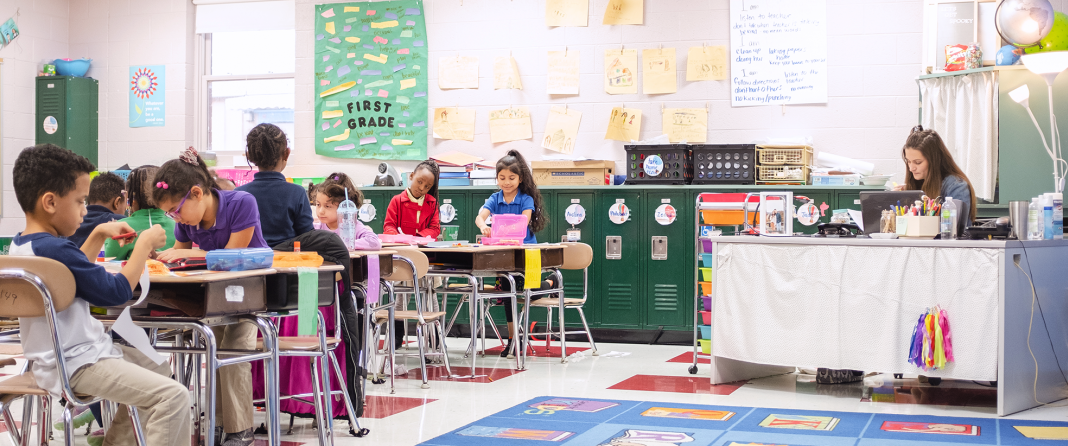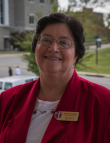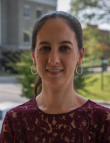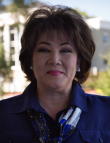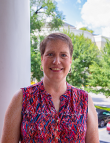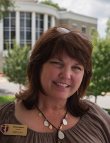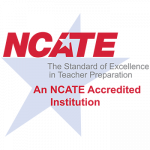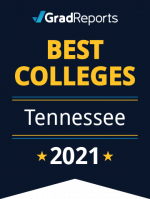Overview
Give New Language Skills to Nonnative English Speaking Children
Become an elementary teacher with an English as a second language endorsement and make a difference in kids’ lives
Those who are called to teach know there’s nothing more gratifying than seeing students thrive with new skills and knowledge. For many kids in schools throughout the United States, though, their progress is severely thwarted because they are not native English speakers. Passionate teachers who want to help students overcome this challenge by equipping them with the language skills they need for academic and life success will find such work extremely rewarding.
Across the country, schools—both public and private—report a shortage of well-qualified teachers with training in teaching ESL; the need is great.
Trevecca’s Bachelor of Science in interdisciplinary studies for elementary education and ESL endorsement prepares students to fill these crucial jobs in schools. Upon completion of this degree, students will be trained to teach in the elementary classroom for kindergarten through grade 5, as well as English as a second language to children in kindergarten through grade 12.
Distinctives of this program:
- Small class sizes: individual attention is a high priority and relationships are built among students as well as faculty
- Experienced faculty: faculty have both public and private school experience; adjunct professors are current practitioners in the education field
- Hands-on learning: students have multiple opportunities from their first year to work with classroom teachers in a variety of settings (urban, suburban and rural schools)
- History of excellence: since 1901, Trevecca has been equipping students to teach and lead
Faculty
News
Core Classes
Public School Health
ALH 2100
Designed to assist the future teacher in developing an understanding of the whole person, including physical, mental, emotional and spiritual development; the continuum of health and how it interrelates with academic performance. Prevention of disease, first aid, CPR, choking, drug abuse, current health issues, and health care agencies are presented to increase the potential teacher's awareness in assisting students in all areas of their lives which affect their academic success.
Course Hours: 2
Language and Literacy
ENG 3180
Addresses language skills including listening, speaking, writing, handwriting, spelling, grammar, and usage. Emphasis on the child's total language development will be addressed. Course includes a 20 hour field experience.
Course Hours: 3
Children’s Literature
ENG 3750
A survey of children's literature in preparation for elementary school teaching and children's librarianship. The best of picture books and prose for children are introduced. Emphasis is placed on implementation of an effective literature program in the elementary grades.
Course Hours: 3
Trends, Models, and Methods in Instruction
ESL 6010
Examines the currently used models of ESL instruction from a variety of school boards and regions. These models are examined in light of language learning theory. Models of integration, inclusion, and other models of differentiated instruction are examined and students are expected to not only understand the differences but to also understand the implications for effective language learning.
Cross listed as EDU 2010
Course Hours: 3
Methods of Assessment and Evaluation for ESL
ESL 6040
Language proficiency assessment for placing is not the same as evaluation of language demonstration and use. This course examines the differences between the two and combines methods with outcomes evaluation. Assessment for "placement" is compared with evaluation of outcomes. Placement is also examined in light of authentic language learning within a school setting. Candidates are expected to understand the various methods as well as produce samples of assessment and evaluation strategies.
Course Hours: 3
English Acquisition
ENG 3150
Explores current approaches, methodologies, techniques, and materials for teaching English language learners primarily in K-12 setting. Designed to provide theoretical and practical experience in language acquisition. Course includes a 10 hour field experience.
Course Hours: 3
Linguistics for Teachers of ESL
ESL 4010
This course includes the study of language transfer issues for ESL students and the examination of both the oral and written domains to provide appropriate instructional scaffolding. A descriptive linguistics course, including a focus on understanding phonologic, syntactic, semantic, and pragmatic aspects of language as they apply to an understanding of any ESL student's native language, significance is also given to sociolinguistic and psycholinguistic aspects of language learning. This is a research course. Fee charged.
Course Hours: 3
United States History Survey II
HIS 2020
Survey of United States' social, political, economic, and military development from 1877 to the present. Offered annually.
Course Hours: 3
Mathematics of History and Cultures
MAT 1090
A History of Mathematics course with an emphasis on the historical development of number systems, algebra, and geometry, as well as the use of mathematics in problem-solving in other cultures and in other times.
Course Hours: 3
Introduction to the Exceptional Learning
PSY 3411
An overview of the issues related to the characteristics of the exceptional learner. Concepts of learning and classroom management in the public school are considered.
Course Hours: 3
Physical Science
SCI 1600
Designed to convey the nature of matter and methods of study in the physical sciences and to study physical science concepts; issues and values related to the well-being of individuals, society and the environment are considered. Lecture and lab. Fee charged.
Course Hours: 3
Earth and Space Science
SCI 2510
Covers topics of geology, astronomy, meteorology, oceanography. Suitable for elementary or secondary education majors and for general education. Lab activities related to each major topic are included. Lecture and lab. Fee charged.
Course Hours: 3
Professional Core
Becoming a Teacher
EDU 1020
Provides observation and participation in a public school. Field study is completed in the following areas: classroom observation, classroom material preparation, and classroom interactions to enhance the knowledge, skills, and professional dispositions required of educators. The requirements for entering the Teacher Education Program are part of the course. Graded S-U.
Foundations of Education
EDU 1500
Surveys the historical, social, philosophical, and psychological foundations of the American school system with emphasis on an introduction to the teaching profession. Designed to be the first course taken in the teacher education program. Taken in conjunction with EDU 1020.
Technology for Educators
EDU 2100
Focuses on media and specific technologies appropriate to teachers in the educational setting, both for instructional purposes and administrative tasks. Includes exposure to and use of various equipment, materials, and software, including Internet and Office. Computer-assisted instruction and management techniques are presented.
Elementary Curriculum and Instruction
EDU 2350
Focuses on effective instructional methods and curriculum models for K-6 teachers. Common Core Standards and best practices in creating enthusiastic learning environments and writing learning plans are explored. Using data to inform instruction is addressed as part of the planning component. A 20 hour field experience is required.
Math for Elementary Educators
EDU 2565
Provides a look at elementary mathematics in-depth. Mathematical concepts will be explored both conceptually and procedurally. Participants will be encouraged to see mathematics not only through the formulas required to find answers but also through creative methods that promote understanding of the concepts. A variety of math manipulatives will be used.
Social Studies Methods K-6
EDU 3370
An interdisciplinary approach to social studies instruction is presented identifying the contributions of the ten themes of social studies and the social science areas; integrating the various elementary subjects; and aligning the national, state, and local curriculum standards in lesson planning and instructional formation. The course analyzes current trends in instructional strategies to accommodate differing learning styles, abilities, and interests and apply learning theories and principles of child development to instructional planning that includes long and short-range goals appropriate for students. Methods to assist the learning of social studies by students with special needs, including English language learners, are included. An emphasis is placed on student participation in lessons, higher-order thinking, visual and performing arts, technology, language arts, inquiry based models, authentic assessment, and project based learning. A 10 hour field experience required. Fee charged.
Educational Tests and Measurements
EDU 3410
Examines test construction and application of evaluation principles related to K-12. Emphasis on reading, interpreting, and using data from a variety of assessments including standardized and teacher-made achievement tests. Common Core Standards will be studied in relationship to both formative and summative assessment as instructional tools.
Elementary Math Methods
EDU 3455
Focuses on current trends, strategies, and materials for teaching mathematics in grades K-6. The constructivist approach to teaching math is emphasized, along with hands-on learning and conceptual understanding of math concepts. A 10 hour field experience in a K-6 setting is required. Fee charged.
Science Methods for K-6 Teachers
EDU 3465
Focuses on current trends, strategies, and materials for teaching science in grades K-6. The constructivist approach to teaching science is emphasized, along with inquiry-based learning and the guided discovery method. A 10 hour field experience in K-6 setting is required. Fee charged. Prerequisite: EDU 2556 and admission to the Teacher Education Program.
Effective Classroom Environments
EDU 2556
Focuses on the major traditional and current behavior management theorists and strategies. Prepares the candidate to use effective strategies for developing a safe but invigorating classroom climate. The creation of a position plan paper and its implementation in a classroom with subsequent re-evaluation of the plan and the candidate's implementation strategies are included within this course.
Reading and Writing
EDU 4130
Focuses on the integration of reading and writing instruction throughout the K-6 curriculum. Emphasis is placed on the objectives, developmental skills, material, techniques, and the processes of assessing, diagnosing, and correcting reading and writing. Instruction includes a holistic view of literacy development. A 20 hour field experience in both diagnosis and remediation in an elementary school is required. Fee charged.
Enhanced Student Teaching
Student Teaching Seminar
EDU 4600
Focuses on the application and analysis of knowledge and teaching skills in the classroom, lesson and unit planning, classroom management, discipline models, and current professional issues. Taken in conjunction with enhanced student teaching. Permission required.
Enhanced Student Teaching K-6
EDU 4640
Provides the culminating fifteen-week, semester-long experience of all who are specializing in elementary education (K-6). Enhanced student teaching consists of full-day classroom observation and practice teaching in two different school settings: one 7 1/2 week placement in grades K-2 and one 7 1/2 -week placement in grades 3-6. Graded S-U. Fee charged. Permission required.
edTPA Seminar
EDU 4730
A prerequisite for Enhanced Student Teaching. This course provides the candidate with experiences in preparation, procedures, implementation, and submittal of required edTPA documentation for initial licensure. Permission required. Graded S/U.
Program Details
Total Credit Hours
129
Program Length
Four years (traditional path)
Mode
Face-to-face, main campus
Outcomes/Careers
Across the United States, there’s a growing shortage of qualified teachers of English to nonnative speakers: “Millions of people in the U.S. … want to learn or perfect their English, almost all of whom are immigrants or children of immigrants. So, it’s no surprise that there are 31 states reporting an ESL teacher shortage.”1
Those areas with the highest need have large immigrant and refugee communities, including California, Florida, Illinois, New York and Texas and other urban and rural areas. 2 The good news is that an increased demand for ESL teachers means greater opportunities for job seekers.
(Graduates seeking initial licensure must complete the necessary state testing requirements for licensure in their subject area of interest, in order to teach in most schools.)
Graduates may work as any of the following:
- Classroom teacher (K-5)
- Classroom teacher (ESL for K-12)
- Educational administrator
- Instructional coach
- Adult education teacher
- Tutor
- Teacher abroad
- Teacher in nonaccredited private school setting
- Teacher or leader in a ministry or community outreach organization
1 Alleducationschools.com,
https://www.alleducationschools.com/blog/what-kind-of-teachers-are-in-demand/
2 Teaching English to Speakers of Other Languages International Association,
https://www.tesol.org/enhance-your-career/career-development/beginning-your-career/teaching-opportunities-in-the-united-states
Financial Aid
What are my options for financial aid?
At Trevecca, we strive to keep our tuition and fees below the national average for private Christian colleges to make this education affordable for families. And best of all, almost 100 percent of our students receive financial aid in the form of generous scholarships, grants, loans, and work-study opportunities—bringing costs much lower.
Financial aid for students typically falls into one of the following broad categories:
- Scholarships are merit-based awards that you don’t pay back.
- Grants are need-based awards that you don’t pay back. These are typically given in addition to scholarships and are reviewed annually.
- Loans are borrowed funds that you repay after you leave college. They feature very low interest rates and long terms.
- Work-Study programs allow you to work and earn money to pay for your education as you go through the college process.
- Service Commitments such as Army ROTC (Reserve Officer's Training Corps). Get more information.
For a detailed explanation of all financial aid options, please visit the Financial Aid pages.
The School of Education receives designated endowment allocations each year. Students are awarded individual scholarships based on meeting the criteria required of the donor. There are federal grant opportunities for those desiring to teach in challenging school settings of high poverty and ESL populations. Information on these grants can be provided by the Financial Aid Office.
Admissions
High school seniors and graduates who have never before attended college full-time should apply for freshman admission to Trevecca.
Deadlines for applying are August 1 for fall semester and December 1 for spring semester.
Our application is free!
FIND OUT MORE ABOUT THE APPLICATION PROCESS
Teacher Education admission also includes:
- GPA 3.0
- ENG 1020 and 1080 (grade earned can be no lower than a B-)
- COM 1010 (grade earned can be no lower than a B-)
- EDU 1020 and EDU 1500 (grade earned can be no lower than a B-)
The testing requirements include:
- ACT Composite 22 or higher OR SAT 1120 (combined verbal and mathematical) OR Core Academic Skills Exam for Educators (reading, writing, math exam)
- Successful completion of Writing on Demand assessment
- Successful completion of Teacher Education interview
- Successful completion of a TBI background check clearance
Required field experiences are completed in a wide variety of school settings in both public and private institutions. We have a primary partnership with Wilson County Schools and use their schools for field experience and student teaching placements. We also have a secondary partnership with Metro Nashville Public Schools in order to provide experience in a broader range of instructional settings. We have to provide evidence of depth to a student's clinical opportunities when submitting their application for teacher licensure. An effort is made to have candidates learn in schools with diverse student populations in terms of race, nationality, socio-economic level, and learning exceptionalities.
FAQs
Is there an application fee?
What are the Teacher Education admission requirements?
What types of scholarship opportunities are available at Trevecca and through the School of Education specifically?
May I transfer into this program after finishing a two-year program at a community or junior college?
Testimonials
“The deciding factor for me choosing Trevecca was having the ability to grow professionally while in a Christ-centered environment. Also, being associated with the prestige of the ESL program/curriculum enhanced my resume, ensuring future success. My experience as a student felt more like a collaboration between student and teacher, which allowed me to come up with practical applications for the classroom.”
Willie D. Boone III (’20)
Master of education in English as a second language (ESL)
“Trevecca’s ESL program helped me learn best practices for teaching my students and helping them take on the many academic challenges they face. At the same time, my classes gave me the tools necessary to advocate for them in and out of the classroom setting.”
Jill Hooks
ESL endorsement student
"Trevecca's School of Education faculty did more than prepare me for my professional career. They also made it a point to teach me and my classmates how to be Christian teachers in a field filled with young people who are starving for positive role models. The success I enjoyed this past school year had a lot to do with the instruction that Trevecca provided and the relationships with faculty members that are still a part of my life."
Brian Johnson '13
Major: Elementary Education
"I have been shaped into the teacher I am today because of the amazing professors in the School of Education at Trevecca. Each professor took time out of his/her day to get to know me individually. If something ever came up in my life, my professors were interested in knowing about it. The professors guided, directed, and prayed for me throughout my four years in college. Their prayers for me and caring nature are more than I could ever ask for in a university staff. I am thankful for their love and support and still keep in contact with them to this day."
Jessica Burgess '14
Elementary Education
"I was drawn to Trevecca's School of Education because of their clear mission: "It is the mission of the School of Education to model competence, character, and compassion so that our students embrace and emulate these qualities in service and leadership." As a teacher, I feel a responsibility and privilege to be a role model and empower my students toward excellence. Trevecca emphasizes both of these goals in their program, focusing on raising up teachers holistically to be leaders in their field. I am proud to be a Trevecca graduate, and look forward to the next steps in my career."
Haley LaBorde-Unruh '14
M.A.Ed.
Overview
Give New Language Skills to Nonnative English Speaking Children
Become an elementary teacher with an English as a second language endorsement and make a difference in kids’ lives
Those who are called to teach know there’s nothing more gratifying than seeing students thrive with new skills and knowledge. For many kids in schools throughout the United States, though, their progress is severely thwarted because they are not native English speakers. Passionate teachers who want to help students overcome this challenge by equipping them with the language skills they need for academic and life success will find such work extremely rewarding.
Across the country, schools—both public and private—report a shortage of well-qualified teachers with training in teaching ESL; the need is great.
Trevecca’s Bachelor of Science in interdisciplinary studies for elementary education and ESL endorsement prepares students to fill these crucial jobs in schools. Upon completion of this degree, students will be trained to teach in the elementary classroom for kindergarten through grade 5, as well as English as a second language to children in kindergarten through grade 12.
Distinctives of this program:
- Small class sizes: individual attention is a high priority and relationships are built among students as well as faculty
- Experienced faculty: faculty have both public and private school experience; adjunct professors are current practitioners in the education field
- Hands-on learning: students have multiple opportunities from their first year to work with classroom teachers in a variety of settings (urban, suburban and rural schools)
- History of excellence: since 1901, Trevecca has been equipping students to teach and lead
